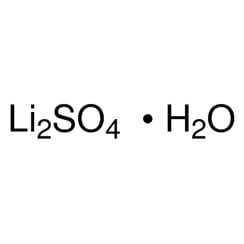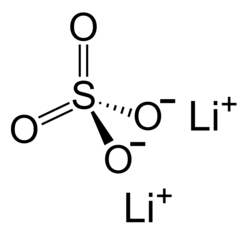You have no items in your shopping cart
Lithium sulphate
Lithium sulfate is a white inorganic salt with the formula Li2SO4. It is the lithium salt of sulfuric acid.
Lithium sulfate is researched as a potential component of ion conducting glasses. Transparent conducting film is a highly investigated topic as they are used in applications such as solar panels and the potential for a new class of battery. In these applications, it is important to have a high lithium content; the more commonly known binary lithium borate (Li₂O · B₂O₃) is difficult to obtain with high lithium concentrations and difficult to keep as it is hygroscopic. With the addition of lithium sulfate into the system, an easily produced, stable, high lithium concentration glass is able to be formed. Most of the current transparent ionic conducting films are made of organic plastics, and it would be ideal if an inexpensive stable inorganic glass could be developed.
Lithium sulfate has been tested as an additive for Portland cement to accelerate curing with positive results. Lithium sulfate serves to speed up the hydration reaction (see Cement) which decreases the curing time. A concern with decreased curing time is the strength of the final product, but when tested, lithium sulfate doped Portland cement had no observable decrease in strength.


